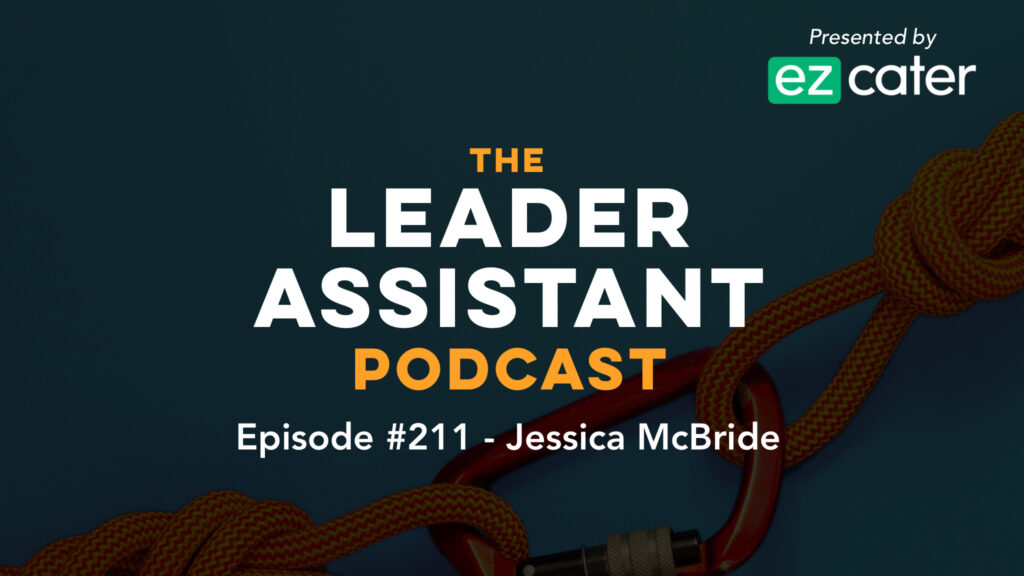Jessica McBride has over 10 years of experience in supporting executives. Her passion lies in communication and how it can shape a company from the top down.
In this conversation, Jessica talks about emotional intelligence, using technology like chatGPT at work, finding (and using) your voice, and being vulnerable in the workplace.
LEADERSHIP QUOTE
If you’re not in the arena with the rest of us, fighting and getting your ass kicked on occasion, I’m not interested in your feedback.
– Brené Brown
CONNECT WITH JESSICA
ABOUT JESSICA
Jessica McBride is an emotionally intelligent and organized business partner with over 10 years of experience in supporting executives. Her passion lies in communication and how it can shape a company from the top down. In 2021, Jessica transitioned to working as an independent contractor, finding better work-life balance that she had struggled to find previously. She was diagnosed with ADHD during the pandemic and has since worked to use her brain’s quirks to her advantage. Jessica works remotely from her home in Cambridge, ON and is a US citizen, soon to be Canadian. Recently, she supported the CEO of Def Method, a software consultancy located in New York City.
–––
THE LEADER ASSISTANT PODCAST IS PRESENTED BY EZCATER
ezCater is the nation’s most trusted provider of corporate food solutions — the best way for companies to order food for daily employee lunches, meetings, and events of any size or budget. ezCater’s simple-to-use platform provides a network of over 100,000 restaurants nationwide, business-grade reliability, food spend management tools, and 24/7 support from their highly trained customer service team.
To explore corporate food solutions or place a catering order, visit ezcater.com.
–––
THE LEADER ASSISTANT PREMIUM MEMBERSHIP
To learn more about how you can join growth-minded Leader Assistants, check out our Leader Assistant Premium Membership for ongoing training, coaching, and community.
THE LEADER ASSISTANT BOOK
Download the first 3 chapters of The Leader Assistant: Four Pillars of Game-Changing Assistant for FREE here or buy it on Amazon and listen to the audiobook on Audible. Also, check out the companion study guide, The Leader Assistant Workbook, to dig deeper.
LEADER ASSISTANT LIVE EVENTS
Check out our constantly updated schedule of events for admins and assistants at LeaderAssistantLive.com.
JOIN THE FREE COMMUNITY
Join the Leader Assistant Global Community for bonus content, job opportunities, and to network with other assistants who are committed to becoming leaders!
SUBSCRIBE
Subscribe to The Leader Assistant Podcast so you don’t miss new episodes!
You can find the show on Apple Podcasts, Spotify, Google Podcasts, Pandora, and Stitcher.
Join my email list here if you want to get an email when a new episode goes live.
LEAVE A REVIEW
If you’re enjoying the podcast, please take 2 minutes to rate and review the show on Apple Podcasts here. Each review helps me stay motivated to keep the show going!
—
EPISODE TRANSCRIPT
Jessica McBride 0:00
Hi, I’m Jessica McBride and today’s leadership quote is by Brene Brown. If you’re not in the arena with the rest of us fighting and getting your ass kicked on occasion, I’m not interested in your feedback
Podcast Intro 0:17
The Leader Assistant Podcast exists to encourage and challenge assistants to become confident game changing leader assistants.
Jeremy Burrows 0:32
With so much on your plate, wouldn’t it be nice if ordering food for the office were easy and reliable. My friends at easy cater our workplace catering pros helping you find food for everything from daily employee meals to staff meetings and special events. With easy caterers network of over 100,000 restaurants nationwide, you’ll have a huge variety of options near you for any group size, dietary need or budget. Your food arrives on time as ordered all supported 24/7 by easy caters team of experts visit easycater.com/leaderassistant to find out more. Hey friends, welcome to The Leader Assistant Podcast is your host Jeremy Burrows and you’re listening to Episode 211. You can check out the show notes at leaderassistant.com/211. Leaderassistant.com/211 and today I am speaking with Jessica McBride. Jessica has been an executive business partner slash Administrative Professional with over 10 years of experience supporting executives and she’s passionate about communication and a bunch of other stuff. So Jessica, how’s it going? Welcome to the show.
Jessica McBride 1:51
I’m so good. This is probably like the coolest thing that’s ever happened to me. So I’m very excited to be here.
Jeremy Burrows 1:56
Awesome. Well, what part of the world are you in?
Jessica McBride 2:00
I am just outside of Toronto, Ontario.
Jeremy Burrows 2:04
Nice, nice. I got to spend some time in Toronto first time ever last year. And it was a fun, fun little trip with the fam. It’s a beautiful city, that’s for sure.
Jessica McBride 2:16
It sounds interesting. You know, I’m from a really small town originally, just like out in Texas, actually. And so moving here and visiting Toronto is always very interesting. For me, it’s a little a little stressful, I will get a little overwhelmed by the big city. So I’m kind of grateful we live just outside exit just outside Toronto about an hour away. And it’s more of a smaller town. Feel. And I do prefer that. But yeah, that’s cool. I like Toronto.
Jeremy Burrows 2:44
Yeah, I mean, I like big cities for visiting. But I don’t know that I would want to live right smack in the middle of a big city.
Jessica McBride 2:50
Yeah, no, thank you.
Jeremy Burrows 2:53
So do you work from home or work in the office? Both
Jessica McBride 2:57
I am fully remote. I work for a fully remote company called Duff method. They’re based out of New York. It’s a software consulting company that has a focus on agile management. And it’s kind of it’s consulting so and contracting. So if companies have a product that they need built, we have engineers and product managers that can you know, be contracted and build the product for them. So it’s pretty cool industry.
Jeremy Burrows 3:29
Nice. And how long have you been with them?
Jessica McBride 3:32
Just about two years now.
Jeremy Burrows 3:34
Nice. And then did you have software world experience before this? Or is this your first dive into that world?
Jessica McBride 3:43
When I moved to Canada in 2015, the area that we live in is kind of like, jokingly known as like Silicon Valley north. And I knew that when I moved here, I wanted to transition into working in the tech industry, like I honestly, I just heard it had a lot of great perks. And I was like I really want to, like get in on this. And so I started focusing my job search on companies specifically that I could use my previous experience to kind of get into a non technical role at a tech company. And so, you know, as soon as I was like, back in the workforce here I was it was you know, I just I wanted to work in tech. So like I said, spend some energy and some time kind of hunting down jobs finally got a break, and have been at a couple of different companies since then.
Jeremy Burrows 4:37
Nice and I’m looking at your LinkedIn and it looks like you’re in sales for a while. Is that right?
Jessica McBride 4:43
They’ll support I cannot do sales to save my life. I don’t have the personality for that. But I think that there’s some portraits like it’s self support versus like being an executive assistant where we tend to be in service of other people and kind of get gratification from that. And that was part of doing self support that I was recognized that I could use in an executive assistant role is that I didn’t enjoy like the the data and the analytics behind it as much as I enjoyed the, you know, being helpful. And you know, making sure that things in the background were getting taken care of.
Jeremy Burrows 5:20
Nice. So then the executive assistant or even just the support admin role, how did you end up getting into this world?
Jessica McBride 5:33
So I was working at a tech company, when, right at the beginning of COVID. And they did not onboard well, and by onboard Well, I mean, I did not get any onboarding. And it destroyed my mental health, like I was really in a bad place because of it. And to the point that, you know, a friend was like, you should try freelancing. And I was so done at this job that I quit, like, just like, hard quit, and was like, I’m just gonna, I’m gonna try freelancing for a little bit. So I started working with some different clients. And I started working with Jeff method. And I really had such a great experience. And I was just like, this is finally what I’ve been looking for in terms of the culture and the trust and like, the, you know, autonomy that I was given in a role. And so I was just like, I really, we decided to work together on a longer term basis. And it’s just been such a great experience for me.
Jeremy Burrows 6:39
Thanks, great. And what’s your maybe top one or two tips as far as working from home?
Jessica McBride 6:46
I don’t know. Because I’m, I love working from home, it’s never been a struggle. For me. It was a very natural transition for me to like, starting to work from home, I have ADHD, and it’s, you know, my attention, it kind of ebbs and flows. So, for me, like, working from home has been such an absolute boon for creativity, I just so much more able to focus. But I guess, really just making sure that you have a quiet space, my husband and I actually, we both work remotely. And we’ve had to take our turn our secondary, you know, our guest bedroom, basically into another office, because it’s so difficult to like, both have meetings that we were just having meetings on top of each other. So just making sure that you have a really nice quiet space. And I do like, I want to get involved with co working like started to need a co working space, because I do kind of miss a little bit of human interaction, but never enough to like fully go back to an office.
Jeremy Burrows 7:51
Yeah. Yeah, I’m the same way. I like remote. I like my space. I like my quiet. I like just sitting in a dark closet getting things done.
Jessica McBride 8:00
Yes, I know, it’s ideal.
Jeremy Burrows 8:04
So one thing I thought was cool. You shared your bio, which I’ll share in the show notes. For those listening leaderassistant.com slash 211. But you mentioned your the kind of the statement to kick off your bio was, Jessica is an emotionally intelligent and organized business partner. What what does it mean in your mind to be emotionally intelligent?
Jessica McBride 8:30
Well, you know, kicked off with a quote, by Brene Brown. And I think that I see a lot of what I want to be in a leader and Brene Brown, and the concept of being emotionally intelligent, and working with working with people as people and understanding that they’re human beings. And putting the person first I think, is really a big priority for me. I always struggled with traditional ideas of leadership, I never really saw myself in any kind of leadership position for a long time, because you don’t often see these values reflected in leadership. So reading through Bernaise work has been such it’s been very, like emotionally emotional for me and that, like it’s, I can finally see myself growing into a leadership role someday because of the example that she has set.
Jeremy Burrows 9:37
Yes, speaking of Brene she, you know, she talks about vulnerability a lot. What, what is, what does it look like to be vulnerable in the workplace?
Jessica McBride 9:50
Something that I found within my company, the company culture currently is that we’ve had a lot of focus on humility, and you know, How that shows up in the workplace. Also, you know, being vulnerable and showing humility is being able to say like, I don’t understand what’s going on, can you answer this question, you know, with a very open atmosphere of no question is off limits. And I think that there was a big, there’s a big step for me when I started realizing that I don’t actually care if somebody in the room thinks that I sound stupid when I ask a question. Because for so long, I would keep I would, you know, kind of keep my thoughts to myself, because I thought, Well, no, there’s no way that everybody must be thinking this, there’s no way that I could have like a unique idea. And so, you know, being given the autonomy and the safety, like the psychological safety, to be able to just ask, like the dumbest questions or throw out, you know, an idea and not have to worry about any type of like ridicule, or being treated poorly, because of it has been really huge for us, you know, being able to be vulnerable in the workspace.
Jeremy Burrows 11:08
Yeah, that’s great. Oftentimes, we hold back, like you said, because we think, Oh, what do we have to offer? It’s like, that’s part of finding our voices, you know, remembering that we do have something to offer. And even if we say something that doesn’t really help, or was already said, or somebody else’s thinking it, you know, it doesn’t matter. It’s,
Jessica McBride 11:32
it’s tried, at least you tried. Exactly.
Jeremy Burrows 11:36
So what about speaking of finding your voice? How Are there any other tactics or, or things that have helped you learn to find your voice and use your voice in your company and companies you’ve worked with?
Jessica McBride 11:55
Yeah, this one’s pretty funny, actually, is, I took a course through this, like life coach that I know, and it was called F perfect. And it really was about how our need to be perfect in life stops us from really like, fulfilling like happiness in life and being successful, it stops us from so many things. And I think this also, like, you know, chitin kind of ties into like, be no longer being afraid to ask a stupid question is that I’m no longer paralyzed by this idea that everything has to be 100%. Perfect. I’m a much more efficient decision maker. Because if I feel like 80% solid about something like I’m gonna go with the 80% option, I don’t need to exhaust every look under every stone. And really just try my best. I’m sorry, that sounds really bad. I do try my best to be good, that I don’t hold this concept over my head anymore, that like, everything has to be perfect at all times. Right?
Jeremy Burrows 13:00
Yeah. It’s very freeing when you realize, and you know, the funny part of the whole perfectionism is that, like, it’s actually impossible to be perfect, so badly. So you’re gonna really try to be perfect and try it and just be unsatisfied your whole life? Or just let it go?
Jessica McBride 13:17
Yes, exactly. And I’m so I got so tired of, you know, and I realized, like, how much it was holding me back from is that like, I really was afraid to try new things. And once I was able to, you know, get past that idea. It opened up this world of possibilities for me of, you know, how many other hobbies can I try because I don’t have to be good at them. Like, you don’t have to be good at something to enjoy doing it. And that was a really big eye opening moment for me as well. That’s great.
Jeremy Burrows 13:51
So you work in tech, and we’re gonna suffer consultant company? How have you personally used technology to improve your, you know, in your role, and in your day to day work?
Jessica McBride 14:09
Yeah, well, I’ve always been very passionate about technology, and using it and the sense that like, I grew up, I think I kind of grew up in that perfect sweet spot of being like a millennial, where I always kind of had a computer available to me from a very, like, you know, maybe like six or seven, we were lucky enough to have a computer. And it was something that I learned in school I was constantly using, and I’ve consistently utilize technology to kind of make my life easier in a lot of ways. And I think that there’s just so much technology out there that people aren’t even aware of exists, that we’re constantly reinventing the wheel. And it’s especially executive assistant. There’s so many like tasks that we do, and that they don’t need to be this difficult. They don’t need to be this time consuming and And so, lately, the thing I’ve really gotten into is Chad GPT, which has been really interesting. And I’m not, like, I’m not an expert, I will never pretend to say that, like, Oh, I know so much about AI. But I’ve gotten into using the program to see how much it does work that we can make easier as an executive assistant and not to like be replaced. I know that a lot of people have concerns about like aI replacing our role specifically. But I don’t know that I really see that happening in the sense that people are always going to need someone else to learn technology for them. And I think that it’s really important in our role that we are utilizing technology and that we’re staying up with current trends. Because there’s so much available, and we know how valuable our time is, why not? Try and save a little bit of time here and there so that we can continue to be the strategic leaders that we want to be.
Jeremy Burrows 16:02
Yeah, so speaking of jet chat, GPT, what, what’s maybe an example or two of how you’ve used it or, or helped your team use it?
Jessica McBride 16:13
Yeah, so I set up, I was just playing around with it. I’m currently recovering from a knee injury. So I have a ton of time on my hands. So I’ve been playing with Chad GPT. And I really was just kind of interested to see, you know, what kind of use cases that I could put together and use for it. So I started, you know, I’m in a couple of different executive assistant communities. And so I started testing problems that they were posting within the community, just to see like, what would be the output. So some of the things that I’ve tested, where there was one person who needed ideas for those two different cities in Japan, and she was trying to say, you know, what kind of itinerary, what should I consider? And, you know, I was able to just basically copy and paste exactly what she put into, you know, onto the post and put it into chat GBT and chat GPT spits out an itinerary or I’m sorry, two different itineraries, as well as compare comparing the cities for saying like, this is what they’re known for. And the thing of GPT is that it doesn’t have information past 2021. But there are a lot of things that we do that don’t need current information for. So you know, for example, standard operating procedures, I’ve had to write those or onboarding outlines. And, you know, the way that we can use it is, what is how many times has your CEO come to you and said, I need you to put together something, and you have no reference to what that means, like, you’ve never done it before. You know, how much of my like, our entire adult career is, like, I was really shocked when I started, you know, working in offices, how much of my job was that of just people being like, I need you to do X, but nobody’s ever done it before. So I just need you to sort it out. And it really is great for giving you a baseline understanding of what you need to put together. So it’s like, give me the steps for a standard operating procedure for using the company credit card, and then it prints out, you know, spits out eight sentences on, these are the steps to use and then you know, you can go and modify them. To be more company specific. It’s not gonna have details about your company. But these are templates and ideas that we can use. And it just saves so much researching time, and trying to find this very niche thing that probably another company hasn’t made. Exactly, but you know, hasn’t outlined for. Yeah,
Jeremy Burrows 18:58
yeah, I’ve used it a few times for for just that, like, basically creating a draft so that you’re not staring at a blank, Google Doc or, you know, a blank piece of paper, you’re actually you get something to work with. It’s a fun, it’s a lot easier to crank out a project, if you can start with something versus nothing.
Jessica McBride 19:19
Yeah, it really helps to generate ideas. And it to me, it feels a lot like when Google first existed. And you would go to Google and you could actually get like a consensus of information. But nowadays, Google, it’s like you go and you’re like, I need to, you know, Google, how to make a standard operating procedure. And the first three listings are ads for companies that will build you a standard operating procedure and then maybe there’s like a, you know, list of like, companies, that’s top 10 best companies that will make standard operating procedures and it’s just always such a hassle to sort through it all. this point. So to get just like a very clear and concise guide of what you need to do is a big help. You know another way that it doesn’t really need us, you can compare, you know, create SWOT analysis of different companies. So, you know, helping support a sales team, I have a lot of interest in who are our competitors? What are they doing, you know, how can we, you know, how can I help the sales team to be more tactical. So, you know, doing a SWOT analysis of like our top three competitors, and it goes through and talks about this is what a possible Pro is, this is possible. Coronas has been really, really helpful for me too, as well. And it’s just this idea of I don’t know, it’s just, it’s a really neat model. I’m really enjoying using it.
Jeremy Burrows 20:53
Yeah, what’s Have you learned anything as you’ve been using it? Like any tips or tricks on what prompts are better than others? Or what maybe needs that you have? are better fit for a tool like that, versus? That’s not really helpful?
Jessica McBride 21:14
Yeah, so one of the ways that like, you can kind of work with Chad GPT is, you tell it, how you want it to respond. So you say, I want you to blank and it’s kind of like, like a roleplay situation where it’s like, I want you to pretend to be the CEO of a tech company. And then, you know, you ask, respond with five different, you know, five different goals than an executive might have. And then, you know, you can kind of target and give it more information, it’s, you know, it’s only going to be as good as the information that you give it. But other ways that, you know, it’s really cool as it can learn to respond in your voice. So you can give it writing samples, and it will even then you can say, like, write an email explaining this and my voice, and it’ll write that awkward email for you that you’ve been avoiding for three days. Like, I don’t know, it’s been really helpful.
Jeremy Burrows 22:14
Wow. Yeah. That’s amazing. And I think it’s just like anything, whether it’s, you know, workflows, and automations, or, like, you mentioned Google when it first came out. And you know, you can even go back farther the internet when it came out, like, you just have to learn to adapt and embrace the new technology and figure out how to use it for your benefit.
Jessica McBride 22:41
Yeah, exactly. Like, it’s just another tool. And not everybody is going to ever learn all the tools in the world. So by staying like on, you know, up on technology and learning all these new skills, you’re only going to set yourself above. Right.
Jeremy Burrows 23:02
Awesome. Well, I know. Thanks for Thanks for chatting. It’s been fun. I actually have one more question that I saw on your LinkedIn, headline, or whatever you said, header, whatever you want to call it on LinkedIn profile? And it said, aspiring chief of staff, can you can you tell us a little bit about what, what what made you want to put that on there? Why are you aspiring to be a chief of staff? What, what draws you?
Unknown Speaker 23:31
I,
Jessica McBride 23:31
what I really like about chief of staff is that it encompasses so much of what we do as executive assistants, but it takes into it’s the first time that I’ve ever seen my skill set represented in leadership as well, in the sense of all the areas that we touch, and all of the ways that we interact with the different departments. And I set up like, I, I want to move into that someday, and I don’t know, I just, I did read, I think I read it somewhere about you know, for job hunting, or in general, like, you want to make it known that this is like what your your your career goal is. And it’s been a good conversation starter for different people. And I think that, you know, it’s something that like I definitely aspire to like later on in my career. It’s something that I definitely probably need more some experience with. But I think that you’re seeing the chief of staff position, more and more in tech companies. And I believe that it’s showing recognition for the level of leadership work that we often do.
Jeremy Burrows 24:47
Yeah, definitely. I agree. And I love it. I just was curious to hear hear that little bit of backstory. So thanks for sharing. For sure. Awesome. Well, let’s see. Oh, Is there anywhere? Like if people want to reach out and say hi, is LinkedIn the best? Is there anywhere else they can get a hold of you? And is it okay? If they reach out and say hi?
Jessica McBride 25:08
Yeah, for sure I did. I added my LinkedIn to the profile. So you can always add me on LinkedIn. Or shoot me a message. I’d love to chat about chat. GPT and, um, yeah, I don’t know. It was really great. Thank you so much.
Jeremy Burrows 25:23
Awesome. Jessica. Thank you and best of luck to you in Canada. And we’ll Yeah, we’ll be in touch and appreciate you being on the show.
Jessica McBride 25:32
Awesome. Thanks so much. Have a great night.
Unknown Speaker 25:45
Please review on Apple podcasts.
Unknown Speaker 25:54
Goburrows.com








